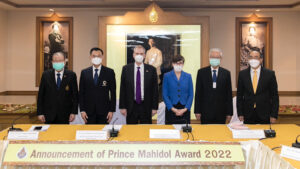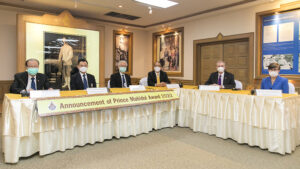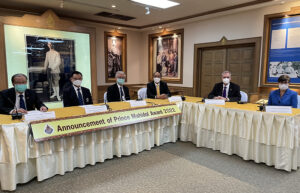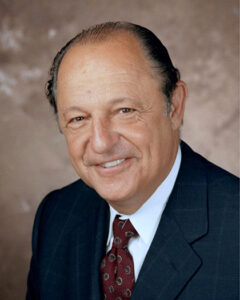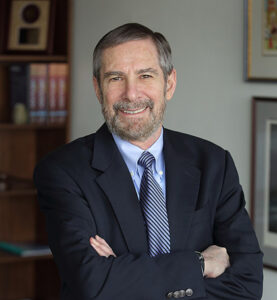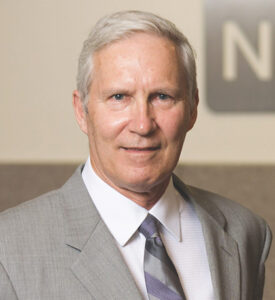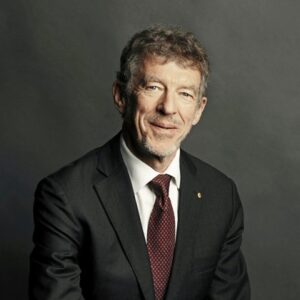On 23 November 2022 at 13.30 hrs, Professor Apichat Asavamongkolkul, Dean of the Faculty of Medicine, Siriraj Hospital, Mahidol University, in the capacity of Vice President of the Prince Mahidol Award Foundation, Clinical Professor Supat Vanichakarn, Secretary General of the Prince Mahidol Award Foundation under the Royal Patronage, Mr. Tanee Sangrat, Spokesman of the Ministry of Foreign Affairs, as the representative of Chairman of the Sub-Committee on Public Relations of the Prince Mahidol Award Foundation, and Professor Vicharn Panich, Chairman of the International Award Committee of the Prince Mahidol Award Foundation, held a joint press conference to announce the 31th Prince Mahidol Award for 2022 at the Prince Mahidol Memorial Room, 2nd Floor, Syamindra Building, Siriraj Hospital.
The Prince Mahidol Award 2022 in the field of Medicine is awarded to Professor Ralph A. DeFronzo, M.D., USA.
The Prince Mahidol Award 2022 in the field of Public Health is awarded to
Dr. Douglas R. Lowy, M.D., USA, Dr. John T. Schiller, Ph.D., USA, and Professor Ian H. Frazer, MB.ChB, M.D., UK/Australia.
There were 88 nominations from 34 countries. The Scientific Advisory Committee carefully screened all candidates from the year 2019 – 2022 and subsequently submitted a short list of candidates to the International Award Committee who made a recommendation to the Board of Trustees. H.R.H. Princess Maha Chakri Sirindhorn presided over the meeting of the Board of Trustees held on 31 October 2022 during which the final decision on the Prince Mahidol Award 2022 was made.
In the past 30 years, the Prince Mahidol Award has been conferred to 90 individuals and groups of individuals and institutions. Among them, 4 were Award recipients of Thai nationality, namely:
(1) Professor Dr. Prasong Tuchinda, from studying the effects of Dengue virus to the disability of children who are sick with dengue hemorrhagic fever, (2) Dr. Suchitra Nimmannitya, from identifying severity classification of dengue hemorrhagic fever. Both of them received the Prince Mahidol Award in the field of Medicine in 1996; (3) Dr. Wiwat Rojanapithayakorn, from founding the project to promote the use of condom to prevent spread of HIVs; and (4) Mr. Mechai Viravaidya, from initiating the comminucation campaign to disseminate the use of condoms. Both Dr. Wiwat Rojanapithayakorn and Mr. Mechai Viravaidya received the Prince Mahidol Award in the field of Public Health in 2009.
Among the Awardees of the Prince Mahidol Award, 5 subsequently received the Nobel Prize:
(1) Professor Barry J. Marshall from Australia was conferred the Prince Mahidol Award in the field of Public Health in 2001 for the discovery of the new bacterium identified as Helicobacter pylori that caused severe gastritis and its sensitivity to particular antibacterial drugs. He received the Nobel Prize in the field of Medicine in 2005 for the same discovery;
(2) Professor Harald Zur Hausen from Germany was conferred the Prince Mahidol Award in the field of Medicine in 2005 for the discovery of the human papilloma virus HPV16 and HPV18 from the cancer tissue and elucidated how
the viruses turn normal cells into cancer cells. He received the Nobel Prize in the field of Medicine in 2008 for the same discovery;
(3) Professor Dr. Satoshi Omura was conferred the Prince Mahidol Award in the field of Medicine in 1997. He is known for the discovery and development of various pharmaceuticals originally occurring in microorganisms. His research group isolated a strain of Streptomyces Avermitilis that produce the anti-parasitical compound avermectin which contributed to the development of the drug ivermectin that is currently used against river blindness, lymphatic filariasis, and other parasitic infections. He received the Nobel Prize in the field of Medicine in 2015 for the same discovery;
(4) Professor Tu You You, a member of the China Cooperative Research Group on Qinghaosu and its Derivatives as Antimalarials, was conferred the Prince Mahidol Award in the field of Medicine in 2003 in an organisational category for the discovery of Qinghaosu as a new drug for treatment of the P.falciparum malaria. He received the Nobel Prize in the field of Medicine in 2015 for the same discovery;
(5) Sir Gregory Paul Winter was conferred the Prince Mahidol Award in the field of Medicine in 2016. He was a pioneer in the field of antibody engineering and modification technology. He invented techniques to humanise antibodies for therapeutic uses, which later led to the creation of cutting-edge therapeutic drugs. He received the Nobel Prize in the field of Chemistry in 2018 for the same discovery.
The Prince Mahidol Award Foundation under the Royal Patronage was established on 1 January 1992 in commemoration of the centenary of the birth of His Royal Highness Prince Mahidol of Songkla. The Foundation is under the Royal Patronage, with Her Royal Highness Princess Maha Chakri Sirindhorn as President.
The Foundation annually confers two Prince Mahidol Awards upon individual(s) or institution(s), who have demonstrated outstanding and exemplary contributions to the advancement of the world’s medical and public health services. Each Award consists of a medal, a certificate, and a prize to the sum of 100,000 USD
Prince Mahidol Award Laureate 2022
in the Field of Medicine
Ralph A. DeFronzo, MD.
(USA)
Professor of Medicine, Diabetes division,
University of Texas Health Science center at San Antonio, Texas, USA.
Professor Dr. Ralph A. DeFronzo received his Doctor of Medicine from Harvard Medical School, Fellowship in Endocrinology from National Institutes of Health and Fellowship in Nephrology from the University of Pennsylvania, the United States of America.
The incidence of type 2 diabetes (T2D) is increasing worldwide, therefore the appropriate T2D management is needed to reduce the incidence of T2D and to prevent the chronic diabetic complications. Professor DeFronzo has persevered in studying the pathophysiology of type 2 diabetes. Using several experimental methods in animals, obese subjects, subjects with a family history of diabetes and T2D subjects, he has helped to define that obesity, especially central obesity, caused the biochemical and molecular disturbances responsible for insulin resistance in T2D. Professor DeFronzo also demonstrated that an increase in glucose reabsorption, via sodium-glucose cotransporter in the kidney, played a role in the pathophysiology of T2D. His work on the pathophysiology of T2D has made metformin and SGLT2 inhibitors the well-accepted first-line medications for T2D management.
Professor DeFronzo also proposed the personalized treatment of T2D by choosing the appropriate medication according to the pathophysiology of diabetes. This concept has been recognized and adopted into current medical practice worldwide. Not only working on the pathophysiology and management of T2D, Professor DeFronzo’s work also involves the prevention of T2D. Obesity plays a major role in insulin resistance, therefore reduction of body weight by intensive lifestyle modification and various medications results in the improvement of insulin resistance and delay or prevention of the new onset of T2D.
The achievement of Professor Dr. Ralph A DeFronzo is the result of bridging and magnifying the research knowledge into the novel pathophysiology of T2D. His exceptional and dedicated works have saved people from T2D and saved millions of T2D patients from chronic diabetic complications.
***************
Prince Mahidol Award Laureate 2022
In the Field of Public Health
Douglas R. Lowy, M.D.
Deputy Director
National Cancer Institute, National Institutes of Health, Bethesda,
USA
John T. Schiller, Ph.D.
NIH Distinguished Investigator
Deputy Chief, Laboratory of Cellular Oncology
National Cancer Institute, National Institutes of Health, Bethesda,
USA
Ian Frazer, M.D.
Emeritus professor, University of Queensland, Brisbane, Australia
Australia / UK
Dr. Douglas Lowy received his M.D. from New York University, USA. Dr. John Schiller received his Ph.D. from University of Washington, USA. Professor Ian Frazer received his M.D. from University of Melbourne, Australia.
Drs. Lowy and Schiller worked together at the National Cancer Institute and discovered that the major virion protein of human papillomaviruses (HPV) could self-assemble into virus-like particles (VLPs) and the VLPs could strongly induce protective immune response against the viruses.
Prof. Frazer working at the University of Queensland discovered the VLP self-assembly process. These researchers then developed VLP production processes from recombinant proteins. This led to the development of HPV vaccines using VLPs, which are highly effective owing to the enhanced immunogenicity and the presentation of native antigenic epitopes to the immune system.
The achievements of Drs. Lowy, Schiller, and Frazer have led to the development of HPV vaccines, which have been internationally implemented. The vaccines have prevented HPV infection, cervical cancer and other HPV-related cancers and saved countless of lives.

